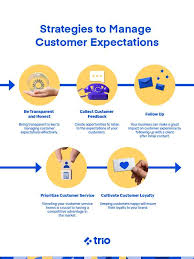Effective Strategies to Manage Customers
Managing customers is crucial for the success of any business. By implementing effective strategies, businesses can build strong relationships with their customers and enhance customer satisfaction. Here are some key strategies to help you manage your customers effectively:
Understand Your Customers
Take the time to understand your customers’ needs, preferences, and behaviours. Conduct market research, gather feedback, and analyse data to gain insights into what your customers want. This will help you tailor your products or services to meet their specific requirements.
Provide Excellent Customer Service
Deliver exceptional customer service at every touchpoint. Train your staff to be knowledgeable, courteous, and responsive to customer inquiries and concerns. Respond promptly to customer queries and issues to show that you value their business.
Personalise the Customer Experience
Personalisation is key to building strong relationships with customers. Use customer data to personalise interactions and offer tailored recommendations based on their preferences and past purchases. Show that you care about them as individuals.
Build Trust and Credibility
Establish trust with your customers by being transparent, reliable, and consistent in your interactions. Honesty and integrity are essential in building credibility and loyalty among customers. Keep your promises and deliver on your commitments.
Seek Feedback and Act on It
Solicit feedback from customers through surveys, reviews, or direct communication. Listen attentively to their suggestions and concerns, and take action to address any issues raised. Use feedback as an opportunity for improvement and innovation.
Reward Loyal Customers
Show appreciation for loyal customers by offering rewards, discounts, or special promotions. Implement a loyalty programme that incentivises repeat business and encourages customer retention. Recognising loyal customers can strengthen their loyalty even further.
In conclusion, effective customer management is essential for fostering long-term relationships with customers and driving business growth. By understanding your customers’ needs, providing excellent service, personalising the customer experience, building trust, seeking feedback, and rewarding loyalty, you can create a positive customer experience that sets you apart from competitors.
Top 5 Tips for Effective Customer Management
- Listen actively to understand customer needs and concerns.
- Communicate clearly and professionally to build trust with customers.
- Be responsive and provide timely assistance to address customer queries or issues.
- Personalise interactions by using the customer’s name and showing empathy.
- Seek feedback from customers to continuously improve your products or services.
Listen actively to understand customer needs and concerns.
Listening actively to understand customer needs and concerns is a fundamental aspect of effective customer management. By attentively listening to customers, businesses can gain valuable insights into their preferences, challenges, and expectations. This enables businesses to tailor their products or services to better meet customer requirements and enhance overall satisfaction. Active listening shows customers that their opinions are valued, fostering trust and building stronger relationships. Ultimately, by prioritising listening as a key component of customer management, businesses can improve customer retention and loyalty while driving long-term success.
Communicate clearly and professionally to build trust with customers.
Clear and professional communication is a fundamental aspect of managing customers effectively. By articulating information clearly and professionally, businesses can build trust with their customers. When customers feel that they are being listened to and understood, it fosters a sense of confidence in the business’s capabilities and reliability. Clear communication helps to avoid misunderstandings and ensures that customers receive accurate and timely information, ultimately strengthening the relationship between the business and its customers.
Be responsive and provide timely assistance to address customer queries or issues.
Being responsive and providing timely assistance is crucial when managing customers. By promptly addressing customer queries or issues, businesses demonstrate their commitment to customer satisfaction and show that they value their customers’ concerns. Responsive communication builds trust and confidence, reassuring customers that their needs are being taken seriously. By offering timely assistance, businesses can effectively resolve problems, enhance the customer experience, and strengthen relationships with their customer base.
Personalise interactions by using the customer’s name and showing empathy.
To effectively manage customers, personalising interactions by using the customer’s name and showing empathy can significantly enhance the overall customer experience. Addressing customers by their name creates a sense of familiarity and shows that you value them as individuals. Additionally, demonstrating empathy towards customers by understanding their concerns and emotions helps build trust and rapport. By incorporating these personalised elements into interactions, businesses can create a more engaging and meaningful connection with their customers, leading to increased satisfaction and loyalty.
Seek feedback from customers to continuously improve your products or services.
Seeking feedback from customers is a valuable strategy to continuously enhance your products or services. By actively listening to customer suggestions and concerns, businesses can gain valuable insights that drive improvement and innovation. Customer feedback provides a direct line of communication to understand what is working well and what areas need refinement. This proactive approach not only demonstrates a commitment to customer satisfaction but also fosters a culture of continuous learning and development within the business.

